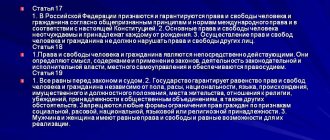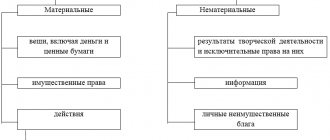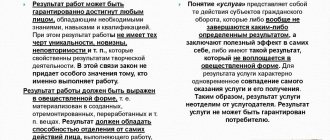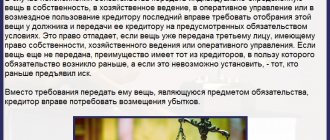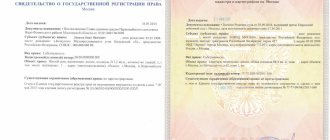Quick navigation
- Signs, types and categories of non-property rights
- Types of non-property rights to individualize a citizen
- Types of non-property rights to personal integrity of a citizen
- Types of non-property rights to the inviolability of a citizen’s life
- Methods and purposes of protecting non-property rights
- Leading lawyers
According to article number 150 of the Civil Code of the Russian Federation, the concept of personal non-property rights implies their exclusivity. This means that personal non-property rights belong to citizens of the country unconditionally from the moment of birth. Such rights do not provide for the possibility of alienation or transfer to other citizens of the Russian Federation, provided that such cases are not provided for by current legislation.
Moral rights are a defining concept from the point of view of non-property relationships between various subjects on the basis of personal intangible values that belong to a specific person in an inseparable manner. The primary components of this set of rights are freedom, equality, and privacy. The settlement of relevant norms is carried out taking into account the norms and provisions of the Civil Code.
The category of rights under consideration is absolute. At the same time, these rights ensure the individual’s right to:
- Putting forward demands regarding the suppression of violations of rights for a particular circle of people.
- Recourse to legal remedies in accordance with applicable law in case of violation of rights.
Signs, types and categories of non-property rights
The main characteristics of non-property rights that are protected by the Civil Code of the Russian Federation are the following:
- 1. Intangibility. Moral rights do not imply the presence of any economic or financial content. Rights of the type in question cannot be assessed in an established equivalent. Thus, persons do not have the opportunity to recover from objects that are the owners of a particular right.
- 2. Individualization. As a rule, the rights of the category under consideration are aimed at individualizing a specific person, taking into account legal grounds and conditions.
- 3. Inseparability. The rights of this category do not imply the possibility of alienation or transfer to other persons, except in cases provided for by the current legislation of the country.
The following can be regarded as special objects of the type of rights under consideration:
- health and life,
- privacy,
- concepts of honor and personal dignity,
- secrets of family and personality,
- results of intellectual or creative activity,
- and so on.
The Civil Code of the Russian Federation defines two separate types of non-property rights based on their relationship:
- 1. Moral rights that are directly related to property rights. Based on this, these rights may be the basis for the acquisition of property rights by a certain person. For example, if a person has created a literary or artistic work, then he acquires the status of its author and the right to further receive the corresponding royalty. Thus, non-property rights provoke the emergence of secondary property rights, which are retained by the person, but provide for the possibility of his refusal to implement them.
- 2. Moral rights that have no connection with property rights. These include those rights and freedoms that cannot be alienated and belong to a citizen of the Russian Federation from birth. This category also includes intangible assets that are protected by current legislation.
In terms of goals, moral rights can be divided into several additional types, depending on what opportunities they open up for the owner:
- Physical well-being - in this case, there is the right to the inviolability of a citizen’s life and well-being, the preservation of a favorable environmental situation, and so on.
- Individualization - in this case we are talking about the right to maintain an honest name, dignity and business reputation. In addition, individualization gives a citizen the right to refute and respond as part of the restoration of private non-property rights after an attack on them, and so on.
- Private physical integrity - the rights of inviolability can concern both the body and the life, health, as well as the personal appearance of a citizen of the Russian Federation from encroachment by the state and third parties.
- Privacy of personal life - this right extends to private housing, and to medical or lawyer’s confidentiality, as well as to other types of secrets relating to communication, making bank deposits, actions on the part of a notary and investigative authorities, and so on.
An additional factor in the division of non-property rights is the interests of the owner:
- Interests in relation to intangible benefits that affect the very fact of a citizen’s life.
- Interests in intangible benefits that relate to family relationships and marriage.
- Interests in relation to intangible benefits that affect the individualization of a citizen in society and a specific group.
- Interests in intangible benefits that arise after a citizen has taken part in public work activities, including the implementation of any creative projects.
- Interests in intangible benefits that arise and affect property relationships.
It is important to note the fact that absolutely all types of listed rights can, under certain conditions, be considered conditional. This relative convention becomes obvious in a situation where the commission of any offense is the cause of concomitant violations in relation to several intangible rights that are related to each other. For example, violation of the right to life and health, as well as a favorable environmental situation.
What do cultural rights provide?
As society develops, its legal scope also expands. In addition to material things, people also need spiritual things. They can and should develop spiritually. Using the rights of a cultural destination, you can:
- Get education. It must be accessible and acceptable.
- Learn in your native language and express your thoughts in it.
- Be creative and choose the direction in which you want to create. Your right to choose stylistics, directions, themes, visual means, etc.
- Use academic freedom, that is, strive to learn the truth in ways that you consider acceptable. The state and other services have no right to stand in your way. Your academic freedom should not be limited in any way.
This legal direction belongs to the second generation and has been implemented in most developed countries.
First hand. Human rights. The Commissioner for Human Rights in the Russian Federation, Tatyana Moskalkova, tells the story. We recommend watching it.
Types of non-property rights to individualize a citizen
This category of non-property legal powers includes the following types of law:
- Rights to personal appearance. It is an actual collection of information data about a particular person, affecting such individual characteristics as figure, physical build, and so on, which can be obtained without conducting specialized research. The essence of the right under consideration implies the inclusion of a wide range of legal powers, on the basis of which a person has the opportunity to independently form and use his own appearance and personal images. Legal powers regarding the right to personal appearance provide the opportunity to obtain material and intangible benefits by granting consent or prohibiting the exploitation of the appearance by other persons. Since 2008, the regulation of this right has been carried out under article number 152 of the Civil Code.
- Rights to personal voice. As in the case described above, in addition to appearance, citizens of the Russian Federation also have the right to use their own voice at their own discretion, including sound recordings of this voice. The right in question contributes to the acquisition of the opportunity to obtain material and intangible benefits through the use of voice, transfer of the right to use it by other persons, both for a fee and free of charge.
- Copyright. The intangible legal powers of the author are a consequence of the personal creation of any work by this person. At the same time as the author, other persons, whose circle is determined in accordance with the current legislation, can also have the opportunity to use the work. Such persons have the right to protect and use authorship after the death of the author. If the participants in legal relations in this case are co-authors, and the issue is acquiring the status of an author, exercising the right of inviolability and publication, then mutual consent of all participants is necessary to make a final decision. The intangible legal powers of authors are protected by current legislation indefinitely.
Basic concepts of intellectual property
Intellectual property is relations arising in connection with copyrights, rights to inventions, rights to a company name/trademark/service.
Intellectual property rights are both moral and property rights to the results of intellectual, mainly creative, activity.
Trademark
A trademark is a designation that is used to individualize goods, work performed or services provided by legal entities or individuals.
The following types of trademarks are distinguished:
- verbal;
- figurative;
- volume;
- combined.
The owner has the exclusive right to use. The validity period of the right is 10 years, then an extension is required.
Invention
An invention is a new technical solution to a problem in any sector of the economy, social development, culture, science, etc., which gives a positive effect.
Main features of the invention:
- novelty;
- inventive step;
- industrial applicability;
- expressed in a certain form.
To certify the right of your invention, you need a document called a patent.
The subject has the exclusive right to use, the right to sell his invention, transfer it to the state or an interested organization for temporary use on the basis of a license. The patent is valid for 20 years.
Authorship
Copyright can arise from creative activities in fields such as science, literature and the arts.
The work must necessarily be separated from the author and exist separately, for example, as a painting, book, etc.
The author has the following rights in relation to his work:
- publish it under your name, pseudonym or anonymously;
- decide whether the work is ready for publication;
- the right to change your work, shorten it;
- allow illustration of the work.
Property rights in the case of authorship are realized in the fact that the author can receive remuneration for the publication or partial publication of his work. Copyright is retained for life, after which it passes to the heirs for a period of 70 years.
Types of non-property rights to personal integrity of a citizen
Moral legal powers in this context relate primarily to life, health and movement, as well as related capabilities. In accordance with article number 150 of the Civil Code of the Russian Federation, life has intangible value and is one of the priority objects of civil rights protection. It is the Civil Code that first of all guarantees the inviolability of life.
According to the provisions of article number 1085 of the Civil Code of the Russian Federation, cases of physical injury to citizens of the country are punishable by law and require compensation for lost income that the citizen could have received while remaining in health. Also, the guilty party is obliged by law to reimburse the costs necessary for treating the victim, purchasing medications, providing the necessary outside care, undergoing a course of sanatorium treatment, and so on. The law itself establishes the amount and scope of compensation in such cases based on the provisions of the Civil Code. In addition, the imposition of specific liability may be carried out in accordance with the contract. For example, paragraph three of article number 1085 provides for the inclusion in the employment contract of conditions for compulsory medical insurance of employees with payment of associated expenses by the employer. In turn, article number 1093 states that the reorganization of a legal entity entails the transfer of the rights and obligations of this legal entity to the legal successor.
A similar category of rights includes freedom of movement, determination of place of stay and permanent residence. According to article number 22 of the Russian Constitution, absolutely all people have the right to make their own decisions regarding these issues. The protection of this legal power is carried out by the Civil Code of the country, article number 150 in particular.
Types of non-property rights to the inviolability of a citizen’s life
In accordance with the Civil Code of the Russian Federation, the right to personal and intra-family secrets, private documentation, and home is protected:
- Personal and family secrets. This legal authority is determined on the basis of Articles No. 23 and 24 of the Russian Constitution. Protection of material wealth is carried out in accordance with Article No. 150 of the Civil Code. This article defines a ban on the collection, storage and distribution of any information that affects the private life of a person without first obtaining consent from that person. At the same time, the Civil Code of the Russian Federation provides for relevant norms regarding the protection of personal life with the involvement of third parties. Thus, doctors, lawyers, notaries, bank employees, etc. are obliged to preserve the confidentiality of clients (patients) without disclosing it.
- Private documentation. The legal foundations of the Russian Federation and archives determine the status of preservation and protection of private documentation belonging to a citizen as property and on the basis of a procedure determined by law, classified as archival documents. This right applies to documents that contain private information. The owners of such documents can be all citizens of Russia, including senders who used the services of the postal operator. The right to private documentation also affects the privacy of telephone conversations. The basis for its occurrence is the conclusion of an official agreement with the appropriate content between the client and the specialized organization. As for private documentation, the right to its inviolability arises from the moment the documentation was given an objective form. Moreover, from the point of view of its content, this right gives citizens the legal authority to make changes or additions to documents, determine the procedure for processing these documents, request a refund, and so on. When sending documentation by post, service employees are responsible for the safety of information. Thus, any violations require payment of compensation.
- Housing. The home of a citizen has absolute inviolability based on the provisions provided for in Article No. 25 of the Constitution of the country. This article defines a ban on the entry of third parties into a citizen’s private home without first obtaining consent from the residents. The exception is those cases in which entry into a home is conditioned by a court decision or other conditions provided for by Federal legislation. Housing becomes inviolable due to the conclusion of a rental agreement, joining a cooperative, acquiring ownership rights, and so on. Both owners and tenants, as well as family members living with them, can be considered as holders of the right to inviolability of the home. The obligation to respect the right to privacy also applies to employees of hotels and inns, and so on.
Methods and purposes of protecting non-property rights
The basic list of methods and means of legal protection of non-property benefits and values is determined by the Civil Legislation of the Russian Federation. The Civil Code establishes a list of acceptable special methods of protection, protection of name rights, intellectual property, and so on. It is important to note that, within the framework of the current Civil legislation, a person who owns one or another intangible right can use any number of acceptable ways to protect it and represent their own interests in pre-trial and judicial proceedings.
All currently provided methods for protecting private non-property legal powers are aimed at protecting inalienable rights, freedom and other types of intangible assets belonging to a person. All existing intangible assets, based on the provisions of paragraph two of Article No. 150 of the Civil Code, are protected by law.
Among the most common basic methods of ensuring protection of non-property rights are the following:
- Confession. For example, to ensure protection of the moral right of the person who created a particular work, the authorized body may recognize authorship of this person.
- Restoring the previous position. If a person’s position has been violated due to an attack on his legal right, then the task of the lawyer and the court is to restore this situation. For example, if information discrediting him or her that does not correspond to real data was disseminated against a citizen, then to ensure protection of non-property rights, an official refutation is necessary using the same sources.
- Suppression of illegal actions. To ensure protection of moral rights in this case, the legislator provides for a ban on the publication of works that contain details about a specific person and his private life, without first obtaining the consent of the “hero”.
- Compensation for material damage. The possibility of compensation for financial losses implies non-property legal powers in case of violation of the inviolability of honor, dignity, and business reputation.
- Compensation for moral damage. As a rule, non-property legal powers imply the possibility of compensation for moral damage in the event of their violation. The amount of compensation for violated non-property legal powers is determined taking into account the circumstances of the case, the severity of the guilt and the suffering that the injured party had to endure.
Qualified assistance from experienced lawyers in cases where your non-property legal powers are violated is of fundamental importance. It is a professional lawyer who will help prepare for the trial and most effectively present the position of his client.
Specialists of the Moscow Municipal Bar Association (MMCA) know everything about Civil Law and are ready to provide a full range of services within the framework of comprehensive legal assistance:
- Consultation in oral or written form. By consulting a lawyer, you will be able to objectively assess the situation, find out exactly what right was violated in a particular case, and what are the prospects for seeking protection in court. At the consultation stage, the lawyer develops an individual legal position, takes into account non-property relationships and their results.
- Carrying out a thorough analysis of documents and case materials. The lawyer pays the necessary attention to all available documents that may confirm the existence of a violation of a particular right, if we are talking about its non-property type. If necessary, the lawyer will also take upon himself the competent preparation of these documents in order to ensure the protection of the citizen’s rights in the future.
- Drawing up requests, complaints, petitions, etc. If the applicant’s private moral rights were indeed violated, the lawyer will take care of the timely preparation and submission of the necessary claims or applications for the effective consideration of the case.
- Mediation and participation in negotiations. When working with the intangible rights of citizens, lawyers take an active part in the procedure of mediation and negotiations to resolve the dispute before going to court.
- Representation of the interests of the principal. The lawyer personally interacts with authorized officials of government bodies and organizations, including in court. At this stage, dealing with the intangible rights of the principal, the specialist will prepare a correct and substantiated statement of claim, collect a strong evidence base, prepare procedural documents, and so on.
- Monitoring the execution of a court decision. If the court makes a positive decision regarding the plaintiff, the lawyer will take care of the proper execution of this decision after it enters into legal force.
The client’s intangible rights are a priority for our specialists. We will ensure that your rights are reliably protected in accordance with the provisions of current legislation.
To make an initial consultation with a specialist and learn more about non-material law in the context of the Civil Code, contact the Moscow Municipal Bar Association (MMBA) by phone listed in the corresponding section of the website, or use the online form to request a call back.
Why should you choose our board?
The lawyers of our panel have significant practical experience in resolving issues in the field of civil law. By turning to them, you can increase your chances of success, acting as both a plaintiff and a defendant. Our specialists know what personal non-property rights include, how to competently draw up and execute procedural documents, what position to take, and how to provide protection in order to achieve a positive court decision. In the professional baggage of the Bar's lawyers there are thousands of cases of this category that are resolved in favor of their clients.
The cost of a lawyer’s services on this issue is from 30,000 rubles.
Sign up for a free consultation with a lawyer
Services for citizens and organizations
| Oral (face-to-face) legal consultation with the duty lawyer with the study of documents submitted by the client | from 2,400 rub. |
| Oral (face-to-face) legal consultation with an industry specialist lawyer with the study of documents submitted by the client | from 4,800 rub. |
| Study by a specialist lawyer of the case materials presented by the client, judicial practice in the case, development of the legal position of the defense (using professional legal resources), outside the framework of an oral consultation | from 1,200 rub. |
| Departure of the duty lawyer to the principal | from 3,000 rub. |
| Preparation of the primary written legal document (application, complaint, petition, legal opinion) | from 7,000 rub. |
| Oral (face-to-face) legal consultation from an industry specialist lawyer without studying documents | from 2,400 rub. |
| Oral (face-to-face) legal consultation of the duty lawyer without studying documents | from 1,200 rub. |
| Hourly wages for a specialist lawyer for comprehensive protection of the client’s rights | from 2,500 rub. |
| Lawyer's request to government institutions and organizations | 4,800 rub. |

